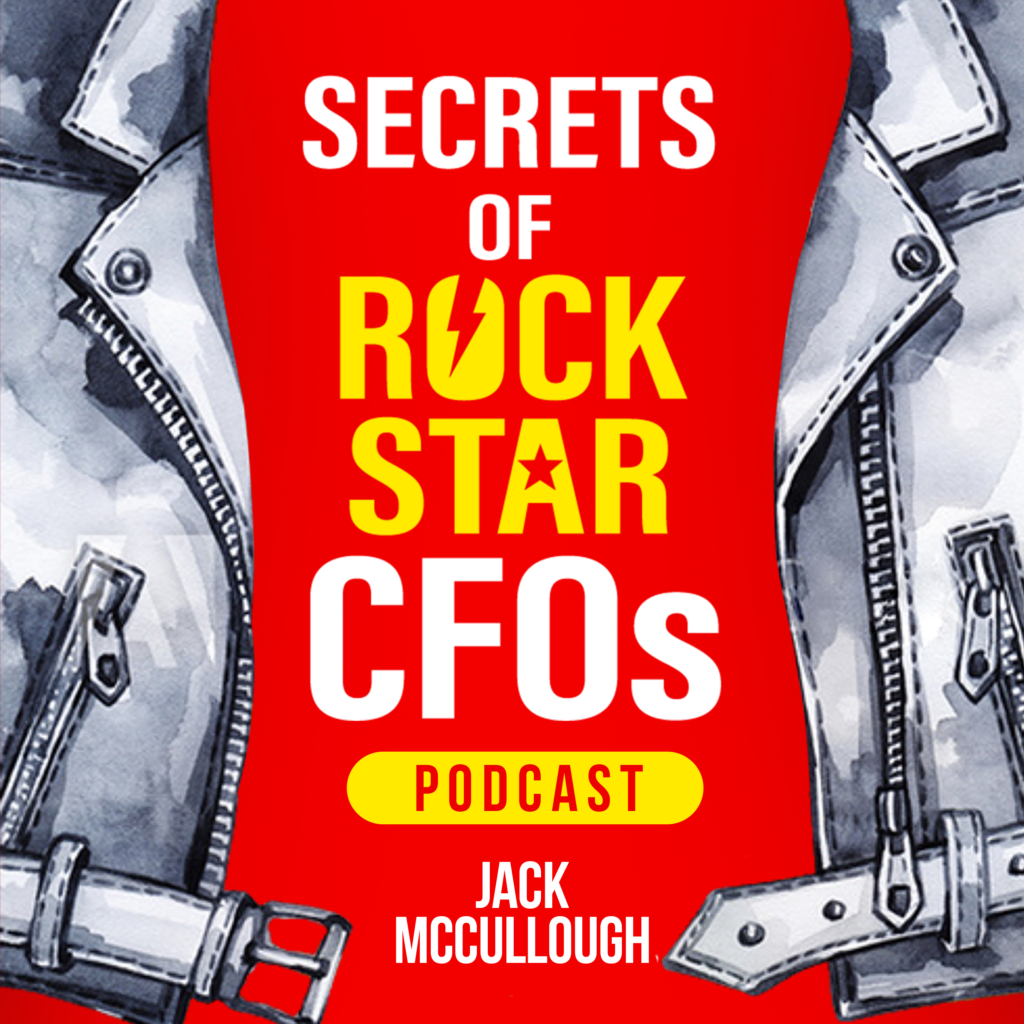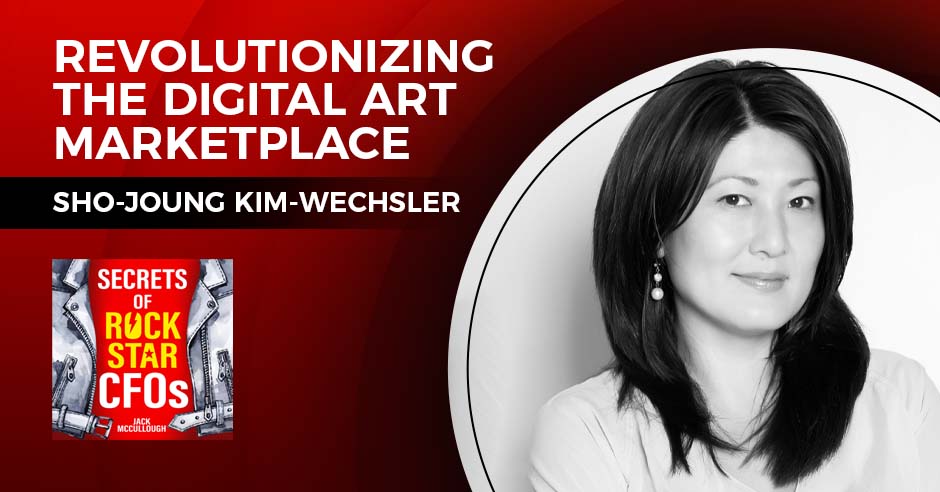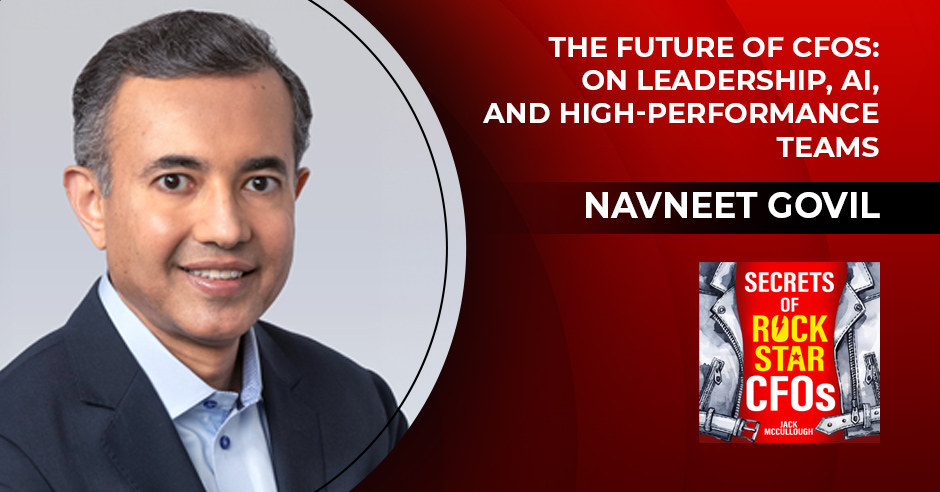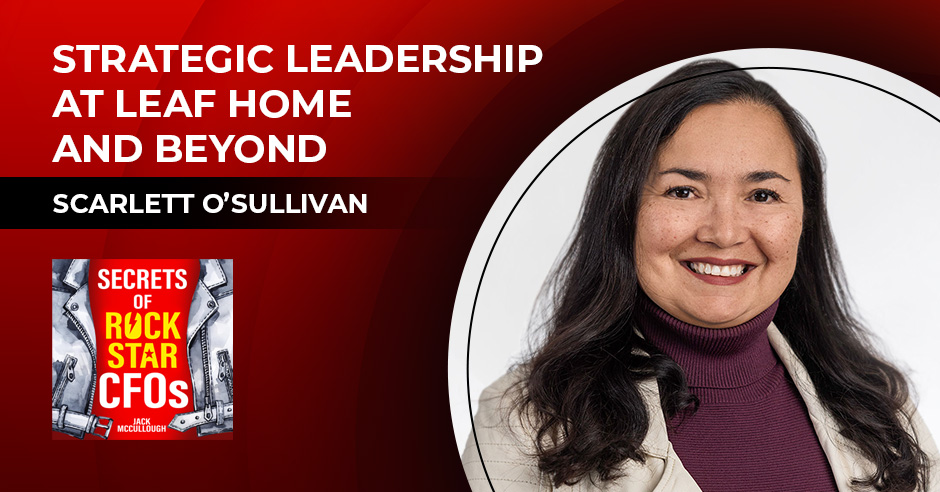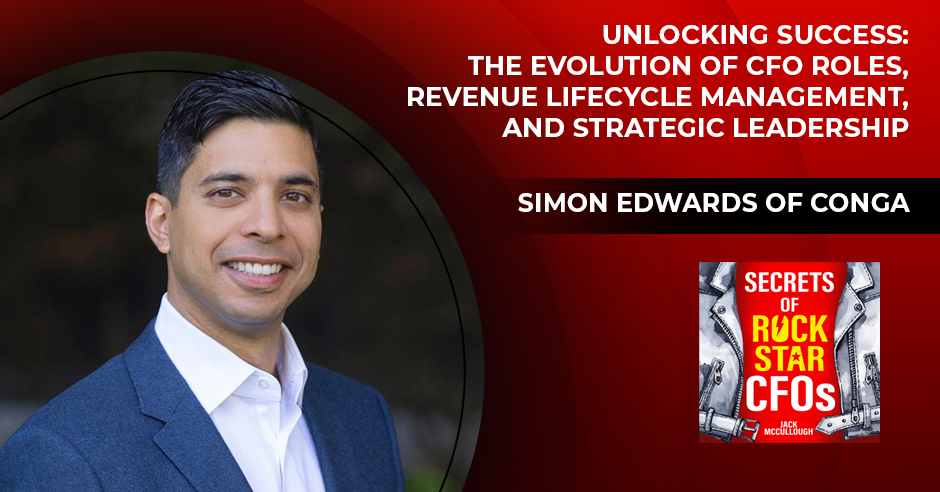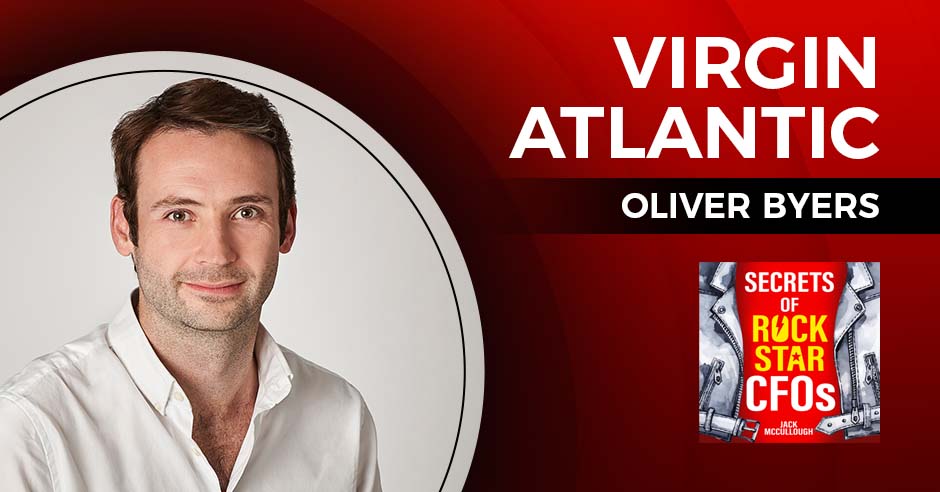Konstantin Dzhengozov, the CFO and co-founder of Payhawk, has achieved a major milestone—with a valuation of $1 billion, the spend management solution has become the first Bulgarian company to achieve unicorn status. While the co-founders had no background in software, their hunger to learn ultimately drove their success. “We wanted to build a business model that is very granular and robust so that we can iterate constantly. This helped us early on to focus on the big picture, understand the value chain of the industry, and see how, when and what we need to do to be profitable and how to build a nice business,” says Dzehengozov.
In the most recent episode of the Secrets of Rockstar CFOs podcast, Jack McCullough sits down with Dzhengozov to discuss his career trajectory, from translator to finance leader, Payhawk’s rise and why they aren’t hitting the brakes anytime soon: “If we are the first Bulgarian unicorn, why not also become the first Bulgarian company to do an IPO in the U.S.?“
Listen by clicking below. The Q&A, lightly trimmed and edited for clarity, follows.
—
Listen to the episode here
Introduction
We have a fantastic guest for this episode. I’ve been looking forward to this one for a while. I’m joined by Konstantin Dzhengozov. He’s the CFO of Payhawk.
‐‐‐
Konstantin, welcome to the show.
It’s a pleasure to be here.
I’ve been looking forward to it. I know you’ve made some incredible progress in the U.S. market where most of my audience are, but I’m sure a few people aren’t completely familiar with Payhawk. Can you give us the 10,000-foot view?
Absolutely. Payhawk is a spend management solution. The way I like to explain our business is we live in an environment where for any company or any type of business to be successful, it must be very well managed. One of the main obstacles in achieving this is getting accurate and timely information and also focusing on cost management. These problems are inherent in companies of every industry, every geography, every site and every size. They do prevent departments within the company themselves from functioning effectively and concentrating on creating the greatest value for the company.
How Payhawk helps those businesses is we manage this process. Our product enables companies to digitalize their spend and their controls. All this is done through our platform where you can easily create and implement spend policies or spending approvals. You can upload receipts or invoices. Our software extracts all the data necessary for your accounting software. We also allow you to make bank payments. You can easily issue corporate cards, whether physical or virtual.
You can easily set budgets on each card, block cards, unblock cards and set very custom workflows. For example, I can issue a card to Jack that works only Monday to Friday, 9:00 to 5:00. If you want to go to the pub after a long and hard day at work and you want to use the company card, I can limit your card so it’s not going to be working at the bar. At the same time, all the transactions and everything that happens is viewable in real-time and you can control it in real-time. You don’t need to wait until the end of the month to get your card statement to see what happened, who expensed what and what the situation is overall with the company’s bank.
We are also offering a procure-to-pay solution. There are a lot of integrations with HR systems and different ERP systems so that both onboarding and offboarding of employees can be done automatically within the relevant spend controls that the company has set. Everything is synced immediately with your accounting system.
Through our platform, businesses can also manage and monitor subscription spend. It’s one of the very big line items in terms of cost spend with every software being a software as a service [SaaS] subscription that automatically renews. You can manage all this through our platform and easily plan better your cash needs for the quarter, the month or the year. You can see the different subscriptions that you have. You can avoid any unpleasant surprises.
We have customers from more than 32 countries. We are perhaps the one product or maybe one of the very few products on the market that can be used by companies within the European Union, the UK and the U.S. Our product is very suitable for companies with a simple structure. Let’s say you only have one U.S. company and you operate only on the U.S. market, but it’s also suitable and can scale as your need scales. For example, for a more complex group structure where you have different offices in different locations and different companies spread across the globe within the European Union, the U.S. or the UK.
That’s great. I understand that you’re a unicorn in Bulgaria. There can’t be very many unicorn companies, and I’m defining that as worth $1 billion. Are you the only one in Bulgaria or are there a few others?
Yes. We are the only unicorn. I’m very proud. It always gives me a very warm feeling to share this with anyone. We are the first unicorn company coming out of a small country in Europe. It’s a huge milestone for us as a company, for everybody that’s employed in the company, but also for the ecosystem as well.
What’s the population of Bulgaria? I don’t even know.
The population is roughly 6.5 million. It’s a very small country.
Early Life And Career
The whole country is a little bit smaller than New York City alone. To have a unicorn in a country that small is very impressive. I know you’re also one of the co-founders, so kudos to you for the vision and the execution. Let’s chat a little about your early life. Did you grow up in Bulgaria?
Yeah, I grew up in Bulgaria. I was born and raised in Sofia. This is the capital of Bulgaria. I travel a lot. I was lucky enough to travel a lot related to my business or any company that I was employed in. I also, on a personal level, enjoy traveling a lot.
Did you have a big family, a lot of brothers and sisters?
I have one sister. She’s older than me. She’s close to five years older than me. She lives in Vienna, Austria, so unfortunately, I don’t get to see her that much. We get to see each other probably 4 or 5 times a year, but we are very close to each other
It’s good that you can see her. With modern technology, you can keep in touch all the time. Tell me a little bit. What was your first job when you were a kid, if you had a job when you were a kid?
The first job that I can remember was being a translator. I used to translate a lot of Bulgarian documents into English. Back then, I don’t think Google Translate was invented or maybe it wasn’t doing a good job as nowadays. I was doing a lot of translation work. When I was in university, I also spent a few months working as a salesperson. I was selling hosting to U.S. companies from Bulgaria, which was a super nice experience because I like talking to people. Unfortunately, I couldn’t keep up with going to university, working full-time and taking night shifts because of the time difference between Bulgaria and the U.S. so I had to quit, but it was very enjoyable work.
It’s interesting. You were a translator. How many languages do you speak?
I speak Bulgarian, Spanish and English.
That’s cool. You went to school at the University of Sofia, I believe, and you studied economics. What were you thinking that you would do with that? You probably didn’t envision yourself as an entrepreneur of a unicorn company. What was the view that made you pursue economics as a field of study?
I was always good at math. I liked analyzing businesses and digging through business ideas. It was a natural progression for me to get involved in economics and finance in general. Early on, my ideal job was to become an investment banker or a consultant. The first job that I took right after university was working for one of the Big Four as a management consultant.
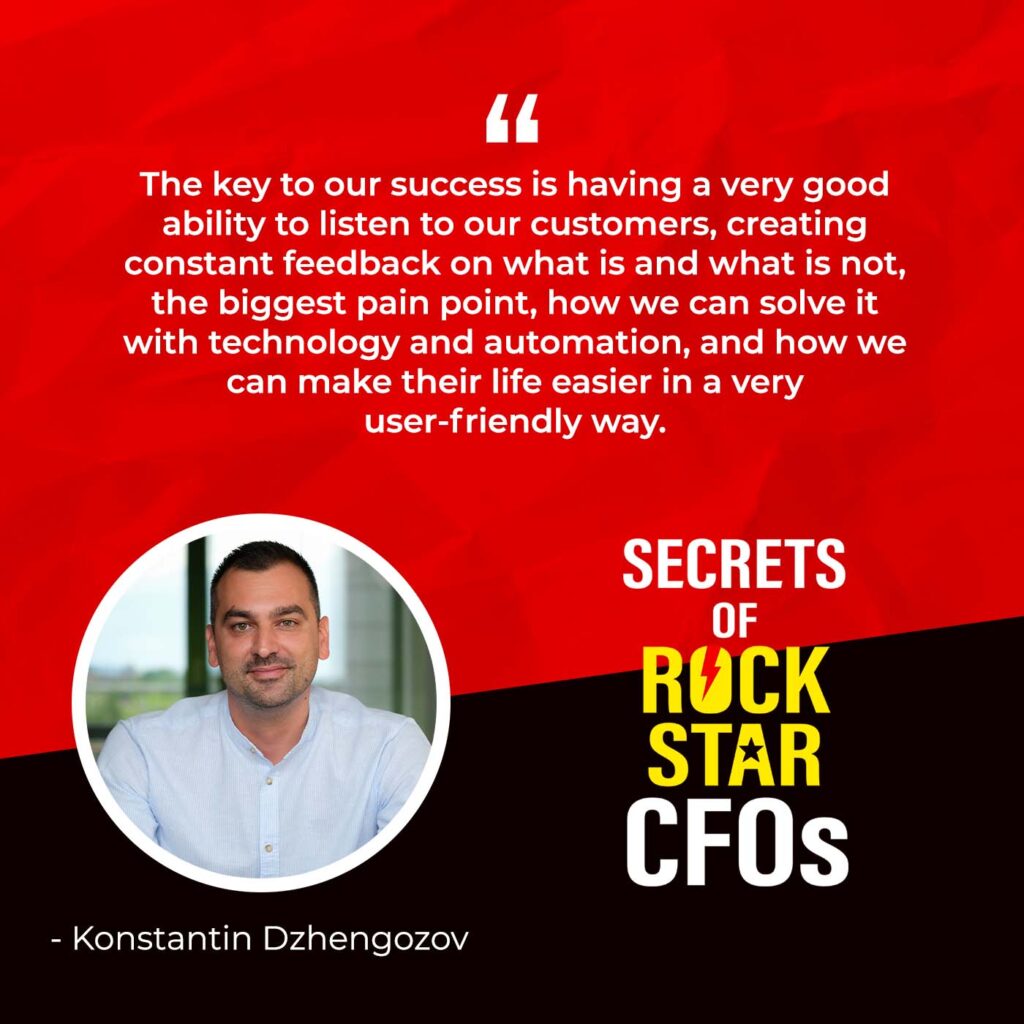
I spent around five years there, working on very different engagements from business valuations to M&A, due diligence and visibility studies. I had a broad range of different experiences that shaped my knowledge. That also strengthened me a lot because working as a management consultant, in general, and in the Big Four, can be very stressful. Early on, I had big exposure working on big projects. It was super fun, but at one point, I thought that maybe it made sense for me to get involved in the real business.
Working as a consultant, you are always dealing with different projects. You might be doing something super exciting for a month in one industry and then you jump into another industry, a different engagement. You don’t really see end-to-end what’s happening with the companies that you are working with. I always wanted to be a bit more involved and see the results from my work end-to-end.
You started your career at the same place as me, KPMG. When were you there?
Right before the financial crisis.
Which one? There have been a few of those. I’m a little older than you, maybe more than a little older than you, so which one?
2008. That’s when I started.
We were coworkers then briefly. I was there from ‘86 to ‘90, and then I was there again from 2010 to 2015. We overlapped my second time. Were you in Bulgaria at KPMG?
Yeah. I was in Sofia, Bulgaria, but we operated on a cluster level, so we had a lot of engagements in the Balkans. For example, Macedonia, Montenegro and Kosovo. We did a lot of engagements in the Balkans in general.
You left KPMG. You went to a company called Progress. Were you the CFO at Progress? I know you were at the next one, the Software Group.
No. Before it was Progress, it was a Bulgarian technology company called Telerik that afterwards got acquired by the U.S. Company, Progress.
My bad.
I had a friend who worked there. They were looking for someone with my profile to join them and to be responsible for doing a lot of the internal valuations. They were doing a lot of acquisitions back then. It was also to help with budgeting, the whole FP&A function. They didn’t have a financial planning and analysis function.
Back then, to be honest, I was a bit hesitant. I wasn’t sure whether this was something that was right for me. I wasn’t sure whether the tech sector was the right sector for me. Looking inside, it was one of the best decisions that I ever made in my life because it completely changed me on a personal and professional basis.
I was lucky enough to be working with the cofounders of the tech company from day one. I had full freedom to do whatever I wanted. I was responsible for the entire budget, doing a lot of the analysis and doing all the valuations for the companies that we were acquiring. We were, back then, an 800-person company. It was not a very small company. It was very interesting. It was very life-changing for me.
Probably one of the most interesting things that I was engaged with is I was part of a very small team that was involved in the entire acquisition when the U.S.-listed company, Progress, acquired us for $264 million. It’s still one of the biggest deals in the region or at least in this part of the world. It was the catalyst for the development of the tech ecosystem in Bulgaria because there were a lot of people who subsequently started companies on their own. I met with the two co-founders of Payhawk as well in Telerik. We are one of the companies that know each other from Telerik, but then we decided to do something on our own. There were a lot of companies that were born after this acquisition, so it was a very big boost for the entire ecosystem.
That’s fantastic. You had an impact. What I find interesting also about your career progression is you were a partner with two different investment funds. Tell me how that came about and what their focus was.
I’ll start a bit with the whole story. Right after we got acquired by the U.S. company, we had very big plans on how to be successful and how to make the U.S. company super successful. Unfortunately, there was a change in strategy, and the founders of Telerik left the company. I stayed there for another year or so. I got a proposal to move to the U.S. to join the C-suite team of the U.S. company and to lead the corporate development, but it didn’t feel right for me. I wanted to spend more time in Bulgaria. This is where my family and my friends are. I decided that I’m very well-rested in Bulgaria and the whole ecosystem here. I decided to stay, and I left Progress.
Right after that, I got approached by one of the co-founders of Telerik because he was doing a lot of angel investments. He wanted my help with structuring a bit, doing a bit more analysis and working with some of the portfolio companies that he has invested in, 50 or 60 companies. This is how I got engaged in the whole VC world. I didn’t stay there for long, though. Right after the Payhawk idea was born, I initially joined as an angel investor, but my time was 100 percent to Payhawk from day minus one even in the idea phase. At some point, I decided to switch and become the third cofounder of Payhawk officially.
I want to get into that a little bit because it’s not never, and, in fact, it’s increasingly common, but there still aren’t a lot of cofounders who become the CFOs of their companies. With your background, it’s a great fit. It’s not like they could go out and get a better CFO than you would be. How is your role different than what a traditional CFO role might be at a company if it is at all?
It is very different. I don’t think I fit a regular CFO type of frame. We are three co-founders. We have Hristo [Borisov] who is the big visionary and the steam engine that gets us all going. He was the person who had the idea of Payhawk in the first place. We have Boyko [Karadzhov] who is behind the product. He’s an engineer. He’s the brains behind the product that we have.
I was left dealing with all the other mess, so to speak. I was responsible for making sure that everything ran smoothly and that we had a sound business model. This meant pretty much engaging in all different aspects from pricing to setting up all the G&A functions, opening offices and making a lot of the policies. You might be having a call with your accountant discussing debit and credits. Fifteen minutes later, you are jumping on a call with an investor, talking about the next 10 years and how they’re going to look. You’re probably back into opening an office in the U.K. or creating a policy for something. It’s very versatile. It’s not limited to finance only.
I really find this fascinating. All my career, I have been very interested in anything outside of the finance world, so how the business works, how we make decisions, how we can be more profitable, how we can execute better and how we can operate in a leaner way. This helps me a lot. First, it is to understand the business, and then I know the finance part pretty well so that I can be the best business partner, hopefully, there could be because we can combine the two things together.
Financial Strategy And Staying Ahead Of The Curve
There’s an expression that may or may not be familiar to you, that you say, “Somebody makes the trains run on time.” It sounds like in the early days, you were that person. You didn’t design the engine necessarily, but you’re the one who made sure that it got from point A to point B. That’s cool. I want to chat a little bit more about Payhawk.
One of the things that’s interesting, and a lot of our members have adopted it, is you’re in a pretty competitive field. What’s your strategy? You’re a customer almost of Payhawk. You have the customer’s understanding. How does your skillset help the company be innovative, keep the product wheels cutting-edge and continue to have that reputation for being on the top of the game?
I can feel our customers’ pain at any time because I am doing the same job as them. I’m the company’s CFO. I cannot honestly imagine my life without a software solution like Payhawk because it saves so much time, stress, and effort from the team and all the other departments. It really makes my life easier.
The key to our success is having a very good ability to listen to our customers and create constant feedback on what is working, what is not working, where is their biggest pain point, how we can solve it with technology and automation and how we can make their life easier. We are also combining this in a very user-friendly way so that it doesn’t matter if you’ve worked with Payhawk for a year. If you are a new user, you can easily get your hands on anything and you can, without any onboarding, pretty much do everything you want to do with the product.
That’s interesting. I want to chat with you also a little about the financial strategy of the company. It sometimes sounds like it might be easy. People may be like, “You’re the CFO of a unicorn. How hard can that be?” I’m sure a lot goes into it. What are some of the financial decisions that you’re making to help the company grow, flourish and keep its competitive advantage?
We iterate constantly. We trade constantly on our business plan and our pricing. Even in the early days, we probably had 20 different versions of our business plan and our pricing in month one when we created the company. We never stop doing this. We always build on top of the existing models that we have. We are always looking for ways to optimize and ways to be more lean as a business.
For us, probably one of the biggest challenges that we had was, first of all, we are coming from the software world. We didn’t spend much time or didn’t have much exposure to the payment service or the payment industry in general. This is something that we had to learn. We’re going into this with a very clear mindset that we need to learn every bolt and every inch of this industry and make sure that our unit economics are sound. We wanted to build a business model that is very granular and robust so that we can iterate constantly. This helped us early on to focus on the big picture, understand the value chain of the industry and see how, when and what we need to do to be profitable and how to build a nice business.
You need to learn every bolt and every inch of this industry, ensuring that your unit economics are sound. Share on XEarly on, one of the key decisions that we made was that we were going to have two separate revenue streams. Unlike probably some of the competitors in the U.S. that started offering their product for free, we decided that we have very good expertise in business in building good B2B software. We are going to be charging for this software as a standard [SaaS] type of offering from day one.
The other revenue stream that we are going to get is from the actual card usage and the actual payment service. Early on, a very critical point in our business model, our pricing strategy and the way we have developed the company is to bet on, “We are going to be selling software. We are going to be providing a payment service as well. We are going to be making money from both of those revenue streams.”
That makes sense. One thing I’ve observed is customer needs and expense management everywhere change constantly. The market now is probably very different than it was a few months ago, and the market six months from now is going to be very different than it is now. What’s your secret to staying on the cutting edge of providing solutions that your customers are going to continue to want? You’re in a great market, but because you’re in a great market, there are a lot of people that like to enter it.
The market that we are in is enormous. We are scratching the surface. We started by providing smart cards and making payment services. We are automating a lot and digitalizing a lot of the processes regarding collecting receipts and invoices, extracting data and pushing those to the accounting system. Looking at the whole CFO office, there is so much that we can do in terms of automation and in terms of giving better products to customers that can make their lives easier.
Just looking at the whole CFO office, there is so much that we can do in terms of automation and giving better products to customers that can make their lives easier. Share on XThis is in all different spheres throughout the CFO office. Let’s say, procurement. How do you sign contracts? How do you manage your budgets? How do you manage your subscriptions? We are constantly building on top. We are looking for any adjacent market niches that we can tap into, and so far, it has been working very well for us.
Leadership Philosophy At Payhawk
That’s fantastic. I want to chat a little bit about your own personal leadership philosophy. You’re an executive in the company and one of the founders of it. How is your own vision of leadership and culture influencing Payhawk and its employees and team? You’re on a rocket ship.
One of the most critical things for me is really not to take myself very seriously.
I knew there was something about you I liked.
The feedback that I get from people is that I’m very approachable. I do this on purpose. No one is hiding in a separate office. We are all sitting in an open space. Everybody can be approached by some employee who started yesterday or someone who has been with us for the last five years or so. We really like to keep the startup vibe and the startup culture, so we don’t have a very strict hierarchy.

We like to be super open. We are focused on what we want to do. We like to hear everybody’s opinion, so everybody’s free to speak. If you see something that doesn’t work or if you see something that needs to be approved or you have a crazy idea, everybody is open for a discussion. At the same time, we try to operate with as much ego as possible. Sometimes, this is hard, but we try to operate in this manner.
We are very strict on the people that we hire in the company. We are really focusing on hiring the top one percent of the talent out there. If someone is not a good cultural fit, we are not going to hire that person because they can spoil the entire culture of the company.
Culture for us is something that we take very seriously. We like to keep the startup vibe. We like to be agile, flexible and approachable. We make decisions fast. We run fast. We even fail fast. We try to experiment with things and fail fast. We see what we did wrong, prepare better for next time and iterate and try again. This is our mindset.
That’s interesting. If you had mentors along the way, who influenced you and shaped your vision for leadership?
I was very lucky because I was working with the two co-founders of Telerik from day one. They play a very pivotal role in my development both on a personal and on a professional level. They were always encouraging me and always trying to help me. We still keep a close relationship. They’re always available if I need any help or if I need advice. They’re calm. They have a low ego. They’re humble people and down to earth. This is what I also try to be because I look up to those people and I want to be like them.
With your own team, how big is the finance and accounting team over at Payhawk?
There are a total of 16 people.
Including you?
There are 16 people. We have an internal team that has all the bookkeeping and the reporting. We have a billing department. We have procurement. We have tax. We have an FP&A team. We also have credit risk.
Payhawk’s Long-Term Vision And Digital Transformation For CFOs
This is the final question on Payhawk. What’s your long-term vision? Where do you see the company being in one, five, and 10 years? Are there things beyond what you’re doing that you think you can get a dominant foothold in?
Yeah. The big vision for us is really to become the global leader in our space. Right now, we are active in the U.S., the European Union and the U.K. The problems that we are solving are applicable worldwide for any type of company regardless of their size and the geography of their industry. We want to be the global player that is going to be leading this space.
Why not even do a big IPO someday in the U.S.? The biggest success for me personally is going to be if we manage to have this impact on the ecosystem the way Telerik had many years ago and expand on that vision so that we can have future entrepreneurs and VC funds from the U.S. and focus on this part of the world. This is going to be a big success for me.
It’s a rare opportunity to make an impact. You mentioned going public in the U.S. Do a lot of Bulgarian companies do that? I know we’re a global market for that sort of thing.
We don’t have a Bulgarian company going public in the U.S. If we are the first Bulgarian unicorn, why not also become the first Bulgarian company to do an IPO in the U.S.?
Why not be the groundbreaking firm? Good for you. I love your vision. It’s so cool. When we were talking earlier, you used the phrase, if I’m getting it correctly, that CFOs should jump on the digital revolution. What does that mean? What’s some of the advice you can give not only for the youngest CFOs who maybe technology is second nature to them but also some of the veterans? My nephews and nieces tease me that I did my accounting on stone tablets. What’s some advice you can give for people to stay up to speed digitally?
There is so much happening, especially with AI and the different advancements that we’re seeing in this space. There is also a generational type of shift in the profile of the CFO. It’s not that focused on debits, credits and reporting but rather on being a very good business partner and digitalizing the entire business processes internally.
We have so many solutions that make our lives easier. We don’t need to spend much time on processes that are very low value added. We can automate a lot of the processes. We can try to leverage a lot of the technology that is available on the market so that we can spend our time and focus our efforts on more value-added tasks, like analyzing numbers, reviewing strategy, iterating fast, adapting to the fast-changing market environments rather than on doing debits and credits, chasing receipts or making reports. All of this can be, to a great extent, automated.
Adrenaline Junkie
That’s fantastic. Another thing I wrote down from our prior conversation is, “Konstantin equals adrenaline junkie.” I know you do some extreme things out there. Maybe you’d love to share a little about that.
I wouldn’t say I’m an adrenaline junkie, or maybe I fit into this criteria, but the sports that I like to do are the type of sports that gets your adrenaline high.
For the record, adrenaline junkie, I believe, is my phrase, not yours.
I need something to get me going to shut my brain off and not think about work, any issues, any meetings that I might be having tomorrow or any conversation that I had in the office. The only way I can do that is if I do something that gets my adrenaline high and I enter survival mode. Let’s say, for example, I’m with my bike on the mountain and I’m doing downhill, or I’m snowboarding or I’m doing something else. I don’t tend to be super extreme, but I tend to focus on things that get your adrenaline high. Otherwise, I switch off.
It’s interesting that you don’t think it’s extreme because I can’t even watch some of those things that you do without getting nervous. I’m not sure. Maybe it’s a little on the extreme side. What’s the most exciting thing of that nature that you’ve done?
I really like biking a lot. Going up the mountain and doing some downhill, I enjoy this because it gets my mind off things. I’m focused on the exact thing that I’m doing. If I’m not, I’m going to fall and I’m going to be falling pretty badly. One of the things that I’m blessed with is I have a very high threshold of physical pain. I can try to experiment a lot and do some crazy stuff sometimes and don’t feel like I’m going to be hurting myself too much. We were chatting right before. I got back from a ski trip in Italy where I managed to dislocate my shoulder three times in a span of close to three hours.
The same shoulder?
Yeah, the same shoulder three times in three hours.
I didn’t even know that it was medically possible to dislocate three times that quickly.
Everything seems to be okay. I was snowboarding three days after in spite of all the medics and all the doctors that I went to who told me that I should rest and I shouldn’t be doing anything. I decided that I was okay to risk it and really enjoy my time in the mountains.
That strikes me as almost nutty. You’re like, “I dislocated my shoulder three times, and one week later, I’m snowboarding.” I chuckled a little bit when you mentioned you had a high threshold of pain. It occurred to me I may well have a high threshold of pain. I have no idea if I do or not. I’ve never been in that situation that I needed to find out. That’s great. I’d love to ask. Other than your passion for these sorts of sports, are there any other fun facts or things about you that might surprise people to learn?
I don’t know. I always find it hard to reply to any fun facts. I like playing tennis. I like doing sports. I don’t have much free time because I have two small kids at home and also a company to manage. I’m not that much of a fun person. I’m probably a boring person. I don’t know.
How old are your children?
Three years old and six months old.
Advice For Aspiring CFOs
An entrepreneur, an executive in a company and children of that age, you have a lot going on. Good for you that you’re able to continue to do things. I always love to close these by asking CFOs for some advice they can give to the next generation of CFOs, those who aren’t quite yet CFOs but view themselves on the path. You’ve already given a lot of great advice for that, but if you could crystallize it into a couple of things, I’d love to know. More importantly, our audience would love to know.
I never imagined that I would become a CFO. It was never something on my agenda, to be honest. The best advice I can give to anyone is to be bold. Don’t go on the traditional beaten path. Try to explore other things. Always expand your vision by looking into other stuff that excites you. There is really no secret recipe on this one. You have to be willing to do a lot of work to be very dedicated.
You also need to be very creative sometimes. Staying on the standard career track and doing all the standard things that are expected of you from university, for me, is not something that works out. It’s always better to explore other opportunities, test other things, especially when you’re young, and see where you best fit.
That’s fantastic. I know you’re a busy guy with a growing company and growing family, so I thank you for making the time to be on the show. I’ll give you the final word.
Thanks a lot for inviting me. It was a real pleasure to talk to you. I really hope your audience enjoyed the chat that we had.

